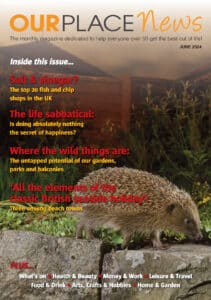From rethinking your bathroom products to understanding where your Christmas decorations will end up, an environmental expert shares some advice.

Silver Surfers reports that single-use plastic items such as plates, cutlery and polystyrene cups look to be banned next as a public consultation is launched by the Government. There are also further calls to limit wet wipes that contain plastic, tobacco filters and sachets.
England uses an estimated 1.1 billion single-use plates (that’s 20 plates per person) and 4.25 billion items of single-use cutlery – most of which are plastic – each year, and just 10% are recycled upon disposal. The UK uses 2.5 billion disposable coffee cups a year – and they are the fourth most littered item.
As part of the new proposals, additional charges could be placed on products which pollute the most; plastic within the items could be banned, and labelling telling consumers how to dispose of them could become mandatory. It follows the ban on microbeads in rinse-off personal care items in 2018.
Environment Minister Jo Churchill said the government is taking “decisive action” to ban problematic plastic items that are being dumped in landfill and bringing in laws to help us recycle better.
“Even the smallest piece of plastic, used just once and then casually tossed away, can remain in our environment as waste for hundreds of years – polluting our soil, tainting our oceans and harming our wildlife,” she said.
“Everyone has a role to play in tacking plastic pollution and it has been great to see that sustainable changes have now become ingrained in many people’s day-to-day routines, such as taking a reusable bag with them when they go shopping; carrying a reusable coffee cup and making purchases based on the amount – or lack of – plastic packaging.”
Jessica Hickie, programme manager for the Environment Agency’s plastics and sustainability team, adds: “Around 12 million tonnes of plastic enters the environment each year – that is a bin lorry load every minute.
“Small actions will add up, so I’d urge you to look for one simple change you can make that will reduce your reliance on avoidable plastic. If we are all kinder to our planet, we can help protect the environment from further harm caused by plastic pollution and leave it in a better place for future generations.”
It may feel like an enormous issue to tackle, but we can all start small. Here, Hickie shares some ways to reduce your plastic use. Pick one, or a few, and go from there.
At home…
- Baking your own bread can cut down on your use of soft plastics. Bread bags and other soft plastics such as crisp packets don’t often get collected by local authorities – but some supermarkets are now starting to offer this service.
- Wet wipes contribute to 93% of sewer blockages in the UK and end up polluting our beaches and riverbeds – switch to using a cotton flannel which can be hygienically washed and reused. Even if a wipe says it is flushable, it is better for our marine environment if you place it in the bin instead.
- Swap the endless plastic bottles in your bathroom for shampoo and conditioner soap bars, which are eco-friendly and plastic free – or look at refill options at your local zero waste shop.
- If you have a floor mop which uses single use wipes, switch to one with reusable cotton pads.
- When it’s time to replace your toothbrush, try switching to one made from bamboo (electric ones are available now too).
- Ditch single use plastic razors for a reusable one. Some brands are offering a subscription (and recycling) service which can be delivered to your door.
And outside the home…
- Keep a set of reusable cutlery in your bag or your work desk so you do not have to use disposable ones.
- Chewing gum is made from plastic and Britain is the second biggest consumer of the product in the world – switch to plastic free chewing gum and always dispose in a waste bin.
- Avoid using plastic condiment sachets – if you have room in your bag, consider bringing your own condiments in small, reusable, glass jars or plastic containers.
- If you are eating in a work canteen, either opt for a plate or bring your own reusable food containers for canteen staff to place your food in. This can help eliminate the use of polystyrene takeaway boxes, which are not commonly recycled and are harmful to the environment.
This Christmas…
- Give experience gifts rather than physical gifts.
- If you want to bring some sparkle to your festivities, use energy efficient fairly lights, and reusable tealights in pretty jam jars, rather than glitter, which can be a harmful microplastic that ends up polluting our oceans.
- Avoid using plastic balloons and balloon sticks – instead make your own decorations such as bunting and paper chains from recyclable materials, or buy durable ones you will be able to reuse and store them away carefully for next time.
And finally…
Start a conversation with a friend or family member about plastic pollution. Lend and borrow items amongst friends, neighbours, family and local community groups. Find out if your local area has a ‘repairs café’ so you can make do and mend items.
(Story source: Silver Surfers)

